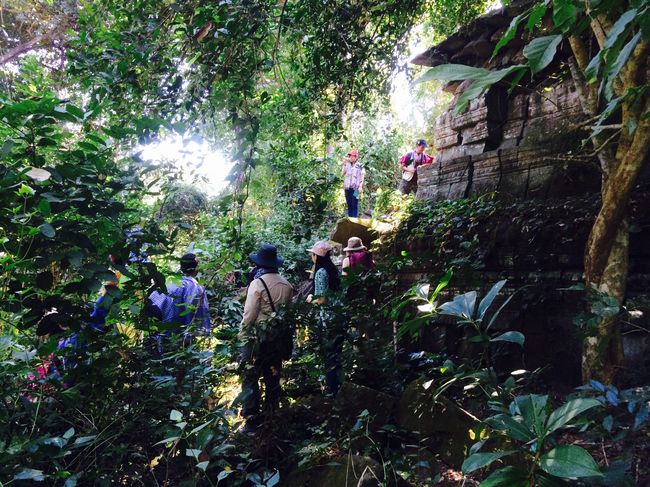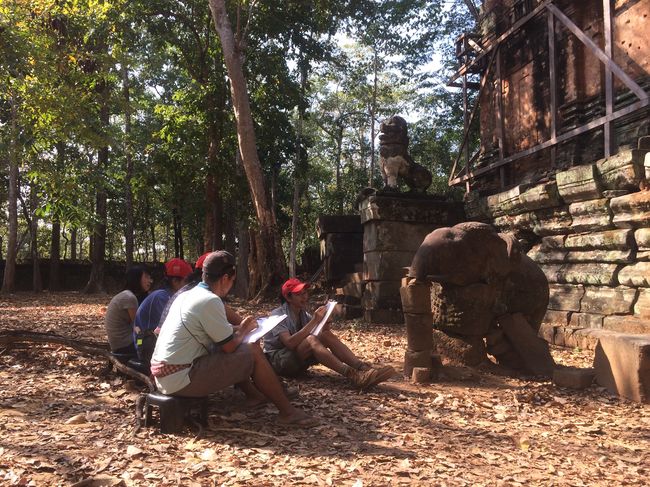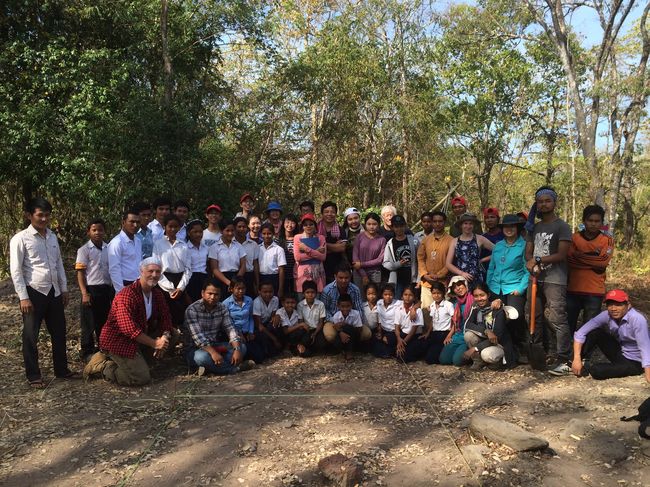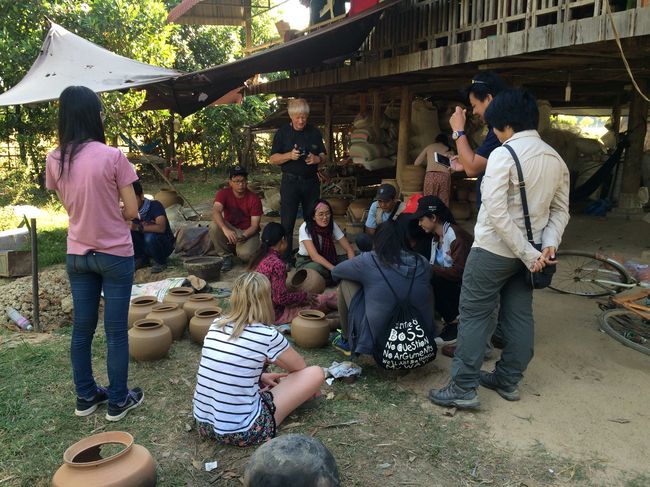
-
- Assessing ISIS in Southeast Asia
- The State of ASEAN’s Food Security
- The Chinese Economy and its Impact on ASEAN
- 5 Realities of the ASEAN Socio-Cultural Community
Individual papers can be downloaded below. However, if you wish to download the complete set in one pdf file, please click here (Note: because of file compression, photos in this combined file may have lower resolution than the individual files below).

-
- Laos’ ASEAN Chairmanship In 2016
- The Future of ASEAN-US Relations
- ASEAN’s Single Aviation Market
- ASEAN Ministerial Meeting on Drug Matters
- Tourism in ASEAN
- Insider Views: Tan Sri Tony Fernandes & Sentot Mujiono
ASEAN Studies Centre
Click here for more information about ASEAN Studies Centre.
Temasek History Research Centre
The Archaeology Unit supports and complements THRC. It also houses archaeological artefacts excavated from our island state in recent years.
Click here for more information about Temasek History Research Centre.
Singapore APEC Study Centre
Click here for more information about Singapore APEC Study Centre.
ASEAN Studies Centre
ISEAS – Yusof Ishak Institute
30 Heng Mui Keng Terrace
Pasir Panjang, Singapore 119614
Telephone: 6870 4510
Fax: 6775 6264
E-Mail: asc@iseas.edu.sg
Web: www.iseas.edu.sg/centres/asean-studies-centre/
FB: www.facebook.com/aseanstudiescentre
Join our mailing list to be updated on ASC events and publications, including ASEANFocus and The State of Southeast Asia Survey.
For career opportunities, please click here or email hr@iseas.edu.sg.
Imagining Asia(s): Networks, Actors, Sites
• When does the idea of Asia (and regions) come into being and how far back in time can we trace these spatial imagination(s)?
• What are the registers of inter-Asian connections?
• What are the logistical aspects governing the routes—overland and maritime—that linked up different regions of Asia?
• Who fashions themselves as Asians and in what context and location?
• What roles did imperial formations (old and new, European and non-European) play in shaping Asia?
• Do ideas of nationalism and post-colonial nation states fracture Asia?
• Does the post-colonial state or elites privilege specific Asian identities over others for their own interests?
• What are the current geopolitical forces that help maintain the neatly defined regional configurations in Asia?
Conveners:
Andrea Acri (NSC & Nalanda University), Kashshaf Ghani (Nalanda University), Murari Jha (Nalanda University), Sraman Mukherhee (Nalanda University).
Venue and dates:
ISEAS–Yusof Ishak Institute, Singapore, 10–11 October 2016
Deadline for abstract submission:
Please send an abstract of between 200–250 words max, along with a short biodata, to both nscconferences@iseas.edu.sg and conferences@nalandauniv.edu.in by 1 April, 2016 (5 pm. Singapore Time, +8 hours GMT).
Notification of Acceptance:
By 17 April 2016.
Funding:
ISEAS–Yusof Ishak Institute will cover accommodation and full board in Singapore for the conference participants from overseas. Limited funding is available to cover international flights (fully or partially, depending on the place of departure and individual situation).
Deliverables:
Selected conference papers will be published in an edited volume.
Focus: Premodern Java
23 July – 2 August 2016
Trawas, East Java (Indonesia)
CALL FOR APPLICANTS
This pioneering Summer Programme will focus on premodern Javanese Art History, in both its local and translocal dimensions. It will cover from the Central Javanese ‘Hindu-Buddhist’ period to the late Majapahit and Early Islamic period (ca. 8th–early 17th century).
This Summer Programme is the result of a partnership between the Nalanda-Sriwijaya Centre at the ISEAS–Yusof Ishak Institute (Singapore), Universitas Surabaya (Indonesia), and SOAS’ Southeast Asian Art Academic Programme (SAAAP) at the Department of the History of Art and Archaeology, School of Arts (UK). It aims to promote the study of Southeast Asian Art History in the region and internationally.
The Summer Programme will be taught by a pool of ten Indonesian and European experts from different disciplinary backgrounds. It will showcase the state-of-the-art research on Javanese Art History and related aspects of culture, history, and religion. It will also introduce the participants to the basics of conservation techniques and current approaches to museology in a local and global context.
Who can apply?
To be eligible to apply for the 2016 NSC-ISEAS/SOAS Summer Programme, you must:
- be a full-time and advanced undergraduate (final year) or post-graduate student pursuing a full-time degree in Art History, Archaeology, Museology, History, or related fields; be a researcher, Museum curator, or civil officer active in one of the above fields (see FAQs).
- have a good command of English (English is the language of instruction).
Location
Held over ten days at Ubaya’s Integrated Outdoor Campus (IOC), the programme will be located at the foot of Mount Penanggungan in the town of Trawas (Mojokerto, East Java). Mount Penanggungan is regarded as one of the most sacred mountains in Java, and identified with the summit of the holy Mount Mahāmeru during the Hindu-Buddhist period.
Tours
The programme will include a one-day tour in the history-rich environs of Mount Penanggungan and a three-day tour to temples, museums and relevant archaeological sites across East Java (i.e. Kediri, Singhasari, Trowulan/Majapahit, Blitar/Panataran).
Programme grants
A grant will be offered to successful applicants to cover their airfare or part of it, depending on their port of embarkation. Boarding and lodging during the 10 days will be covered by the organisation.
How to apply
- Application form and instructions can be downloaded here.
- For more details about the programme, please read the programme brochure.
- Check out our FAQs for answers to commonly asked questions. If your question was not answered in the FAQs, kindly direct them to nscsp2016[at]iseas.edu.sg.
- Application deadline: 31 March 2016
Coordinators
Dr. Andrea Acri | andrea@iseas.edu.sg
Dr. Helene Njoto | helene_njoto@iseas.edu.sg
Dr. Peter Sharrock | ps56@soas.ac.uk
If you wish to download a pdf copy of the programme e-flyer (announcement), please click here.
To find out more about our Centre, you may visit http://nsc.iseas.edu.sg.
Visiting Fellowship at the Nalanda-Sriwijaya Centre of ISEAS-Yusof Ishak Institute, Singapore
The Nalanda-Sriwijaya Centre (NSC) of ISEAS-Yusof Ishak Institute (ISEAS) in Singapore pursues research on historical interactions among Asian societies and civilizations prior to the 17th century. NSC is now accepting applications for Visiting Fellowship positions from scholars at all ranks who wish to undertake research and writing under the following themes:
The Visiting Fellowship will be for one year, with a possibility of extension. Post-doctoral applicants are also welcome but should have graduated with a PhD no longer than three years prior to their successful appointment at NSC.
Commencement date will be from June 2016.
Responsibilities
Successful applicants are expected to complete a paper on the proposed topic (to be published in a peer-reviewed journal), organise or contribute to a workshop, and give a public seminar hosted by ISEAS. They are also expected to contribute to the intellectual environment of NSC and assist in developing NSC’s publications series where possible.
Fellowship Benefits
Successful applicants will receive a monthly (all-inclusive) stipend that is commensurate with his/her rank and experience. A round-trip economy airfare between the home country of the researcher and Singapore will also be provided (applicable to non-Singaporeans only).
Application
Applicants should include with their applications a cover letter, a full CV, two reference letters, and a research proposal of not more than five pages (double spaced). The proposal should discuss the topic to be examined, plans for any fieldwork, project time frame, and envisaged output. The preferred period for the fellowship should also be indicated.
The deadline for applications is 31 March 2016. Applications should be sent to the following address:
Enquiries: Please contact Mr Ang Swee Loh, Deputy Head of Administration (sweeloh@iseas.edu.sg; Tel: (65) 67780955)
(Only short-listed candidates will be notified)
This announcement can also be accessed here in jpeg.
To find out more about our Centre, please visit http://nsc.iseas.edu.sg

- ASEAN Community Vision 2025 Declaration
- Analyses of the Political-Security, Economic, Socio-Cultural Pillars
- Views from the Secretaries-General
- Views from ASEAN Dialogue Partners
- Views from the Business, Media and Research Communities

Koh Ker Field School – Torp Chey site visit, survey, and lecture (Credit: Dr. D. Kyle Latinis).
The Archaeological Unit (AU) at ISEAS – Yusof Ishak Institute (ISEAS) conducted an archaeological Field School from 2-22 December 2015 in Koh Ker, Cambodia. This was in collaboration with Cambodia’s APSARA Authority and was the third Field School conducted by AU in Cambodia.
There were a total of 12 students who participated in the Field School from a variety of East Asian countries including Cambodia; Indonesia; Laos; Vietnam; Philippines; Myanmar; Hong Kong; New Zealand; and Singapore.
The itinerary featured interactive site visits and informal on-site lectures. Hands-on training sessions took participants and staff through 2000 years of complex socio-political and economic evolution. Topics also included urbanisation, exchange dynamics, cultural influence, and multi-directional agency among pan-Asian networks. The pivotal points of analytical foci and departure spanned the famed Khmer polities of Funan (1st-6th centuries CE), Chenla (7th-8th centuries CE), and Angkor (9th-14th centuries CE).
The main event included coordinated archaeological and anthropological operations at multiple sites within the enigmatic 10th century Angkorian capital city of Koh Ker associated with the reign of Jayavarman IV. Participants lived on-site (in the forest) working with professional staff and local community members. They trained at three excavation locales to cover a diverse range of approaches, techniques and research questions. The results will provide valuable contributions to science, archaeology and history.
The final Field School leg in Singapore provided an important comparative component, added training opportunities, facilitated library access and allowed participants to finalise and present team projects.
The Field School was funded by the Ministry of Foreign Affairs, Singapore. Primary institutions included ISEAS and APSARA Authority. Supporting partners included the Ministry of Culture and Fine Arts, Cambodia; the Royal University of Fine Arts, Cambodia; The Royal Academy of Cambodia; the National Museum of Cambodia; the Hungarian Southeast Asian Research Institute; Ecole Francaise d’Extreme-Orient; and an extensive list of several other organisations and independent researchers who provided invaluable input, advice, opportunities and support.
Field School Director: Dr D. Kyle Latinis (ISEAS)
Field School Co-Director: Dr Ea Darith (APSARA Authority)
Field School Archaeologist and Operations Manager: Ms Foo Shu Tieng (ISEAS)
2015 Field School Administrative History
Announcement
Booklet (pdf, 1.23MB)
Call for applications (pdf)
Application Form (doc) (Deadline: 5PM (+8GMT), 21st Sept 2015)
Frequently Asked Questions (pdf)
Image Gallery

Archaeological Field School site visits and landscape archaeology training and historical ecology modelling at the ancient urban sites of Phnom Chisor and Angkor Borei, Cambodia. (Credit: Dr. Ea Darith)

Dr. D. Kyle Latinis (Field School Director) conducting surface survey, mapping, and landscape Archaeology training at Angkor Borei. (Credit: S. T. Foo)

Dr. Ea Darith (Field School Co-Director) discussing epigraphy and bar relief analysis at Angkor Wat. (Credit: S. T. Foo)

Art and architectural history training by Dr. Helene Njoto at Angkor Wat. (Credit: Dr. Ea Darith)

Field school students at Sambor Prei Kuk – site visit, applied research design, and site preservation training. (Credit: S. T. Foo)

Koh Ker Field School – Auger-coring and soil analysis training. (Credit: Dr. D. Kyle Latinis)

‘ASEAN-style’ group shot at Prasat Srayang, Koh Ker temple complex– site visits, survey and lectures led by the Hungarian Team. (Credit: S. T. Foo)

Excavation at Koh Ker 2 – recovering an intact early Khmer glazed jarlet. (Credit: S. T. Foo)

Mr. Aaron Kao conducting site and feature drawing training at Prasat Damrei, Koh Ker. (Credit: Dr. D. Kyle Latinis)

Local students and teachers visiting Koh Ker excavations as part of the interactive outreach initiatives. (Credit: Dr. D. Kyle Latinis)

Ethnographic and Ethnoarchaeological training with S. T. Foo at Kampong Chhnang traditional pottery making village. (Credit: Dr. D. Kyle Latinis)

Mr. Michael Ng briefing field school participants at the Archaeology Unit office, ISEAS – Yusof Ishak Institute, in Singapore (Credit: Dr. Ea Darith)

Field School students at ISEAS – Yusof Ishak institute. (Credit: Dr. Ea Darith)

Field school students giving a group presentation. (Credit: Loh Joo Yong)























